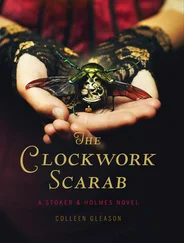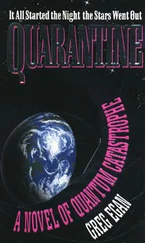Greg Egan - The Clockwork Rocket
Здесь есть возможность читать онлайн «Greg Egan - The Clockwork Rocket» весь текст электронной книги совершенно бесплатно (целиком полную версию без сокращений). В некоторых случаях можно слушать аудио, скачать через торрент в формате fb2 и присутствует краткое содержание. Жанр: Фантастика и фэнтези, на английском языке. Описание произведения, (предисловие) а так же отзывы посетителей доступны на портале библиотеки ЛибКат.
- Название:The Clockwork Rocket
- Автор:
- Жанр:
- Год:неизвестен
- ISBN:нет данных
- Рейтинг книги:3 / 5. Голосов: 1
-
Избранное:Добавить в избранное
- Отзывы:
-
Ваша оценка:
- 60
- 1
- 2
- 3
- 4
- 5
The Clockwork Rocket: краткое содержание, описание и аннотация
Предлагаем к чтению аннотацию, описание, краткое содержание или предисловие (зависит от того, что написал сам автор книги «The Clockwork Rocket»). Если вы не нашли необходимую информацию о книге — напишите в комментариях, мы постараемся отыскать её.
The Clockwork Rocket — читать онлайн бесплатно полную книгу (весь текст) целиком
Ниже представлен текст книги, разбитый по страницам. Система сохранения места последней прочитанной страницы, позволяет с удобством читать онлайн бесплатно книгу «The Clockwork Rocket», без необходимости каждый раз заново искать на чём Вы остановились. Поставьте закладку, и сможете в любой момент перейти на страницу, на которой закончили чтение.
Интервал:
Закладка:
A few sickly buds on the trees did open in the gloom, but they soon closed again as brighter lights were trained on the stage from above. Yalda looked up and caught a glimpse of a girl perched on a narrow railing, struggling to maneuver an unwieldy contraption of burning sunstone behind a clearstone lens.
The impresario walked onto the stage and delivered a spiel about the perilous expedition that had been mounted to the Shining Valley to capture the subject of the night’s demonstration. “In its natural state, this creature is too ferocious to be allowed into the city at all; the Council would never permit it! However—after feeding the beast stupefying drugs for six days, in a holding pen a safe distance beyond the city limits, we are able to present, for the first time ever in Zeugma, our wild, uncultured cousin: the arborine!”
A cart was wheeled on, bearing a thick branch suspended between two supports. The arborine’s hands and feet were bound to the branch with ropes; it was in no state to grip anything itself. Its head hung limply, and though its eyes were open they were dull and fixed. Yalda thought it was a male, but she wasn’t sure; she’d only ever seen sketches of the animal before. Certainly it was smaller than she was.
“I hope it’s already dead,” she whispered.
Tullia said, “Ah, a sentimentalist.”
“Why should it feel pain for our entertainment?”
“Do you think it lived a life of comfort in the trees?”
Yalda was annoyed. “No, but that’s beside the point. Nature wants to split your body in four and pulp your brain. We should be aiming higher.”
A man in front of them turned and hushed her.
“Only a woman,” the impresario was saying, “could possess the physical strength to handle such a beast. But we are lucky to have found a woman with both the strength and the expert knowledge to be our guide into this dangerous territory. From Zeugma University, I give you: Doctor Daria!”
As the crowd erupted with the sound of acclaim, Tullia whispered, “Don’t worry, fashions change. One day we’ll be up there with our prisms and lenses, raking in just as much cash.”
Yalda said, “Only if there are other-worldly arborines in your forests in the sky.”
Daria strode into a waiting spotlight, a third arm sprouting from the middle of her chest. She was carrying a circular saw connected to a long tube that stretched all the way back into the wings.
“Rest assured,” she said, “we will all be safe tonight.” She held up the saw for their inspection. “This instrument is powered by compressed air, and makes a dozen gross revolutions every flicker. Should the arborine somehow escape from its stupor, I can sever its head in an instant.” She squeezed a trigger and the blade became a blur of screeching stone.
“Now, though, it’s time to feed our wild cousin his very last meal.” An assistant brought a bucket onto the stage; Daria took it and approached the arborine. With a scoop that was sitting in the bucket, she lifted out some of its contents—which resembled coarsely milled grain, but had somehow been rendered a startlingly vivid red—and poured it into the arborine’s slack mouth.
Yalda watched with revolted fascination as the muscles around the arborine’s throat began to move. It was alive, and, drugged or not, still able to swallow.
“You might be wondering at the unusual hue of our unfortunate guest’s repast,” Daria noted. “In fact, over the past six days his food has been mixed with a different dye for every meal.” As she spoke, the arborine kept gulping mechanically at the trickle of grain.
When the creature would take no more food, Daria put the bucket aside and set her blade spinning. With the audience cheering her on, she stepped up to the arborine and began carving into its flank.
If her victim made a sound, the machine was more than loud enough to conceal it. Yalda could see the arborine twitching pitifully for a while, but by the time Daria stood aside to reveal her handiwork its convulsions had ceased.
The saw had removed a wide rectangular slab of skin and muscle that stretched almost the full length of the arborine’s body. Yalda was sickened by the needless cruelty of the methodology, but she did not look away.
The red-dyed food had penetrated a surprising distance already—perhaps four or five spans from the creature’s throat—but it was the evidence of past meals that was truly revelatory. The six bands of color painted a veritable history of digestion and excretion: the previous day’s orange meal had been squeezed from the esophagus into dozens of smaller tubes that branched out from that central passage, while the yellow had progressed into a multitude of vastly finer tubules. The green dye occupied a convoluted surface that curled around within the arborine’s flesh, like some huge tarpaulin that had been folded and re-folded on several different scales in order to pack it down to the smallest possible volume; Yalda suspected that it, too, had been carried by a system of tubes that were simply too fine for her to resolve from this distance. The green layer, Daria explained, was food that had finally come within reach of virtually every muscle in the body.
For the still-earlier meals, a similar process could be seen in reverse: fine vessels gathered up the unused portions of the food, along with a cargo of metabolic wastes, and brought them together in ever-larger conduits. At the far end of the gruesome window, a cluster of violet faeces could be seen, waiting to be expelled.
“Six days—half a stint—from mouth to anus,” Daria marveled. “So long to cross such a short distance. But then, most foods need to be milled finely by the body—crushed and re-crushed by the muscles at every junction—and every scrag of nutrition needs to be extracted along the way.
“One question might occur to you, though: if it takes so very long for our vital sustenance to travel through the body, how does the will to move pass from the brain to the limbs in an instant? While it’s true that the passage of food is deliberately sluggish, no chemical we know of can diffuse through a solid or a resin in the requisite time, nor can muscular contractions convey any cargo through a tube with sufficient rapidity.”
The stage dimmed, and an assistant wheeled on a new prop: a small sunstone lamp, burning fiercely but covered with a hood that allowed only a narrow beam of light to escape. Daria directed the beam onto the arborine’s exposed flesh, taking some time to aim it carefully; perhaps she wished to highlight a particular feature, but she offered no explanation for her choice.
Next, she took a knife and cut the rope that bound one of the arborine’s arms to the branch from which it was suspended. A murmur of disquiet spread through the crowd, but once freed the limb simply hung from the creature’s shoulder like a long sack of meat.
Daria said, “Some philosophers and anatomists have conjectured that a gas, not unlike air itself, might be spread or squeezed throughout the body in order to convey our will to move. On the contrary, my research has shown that the answer is both simpler and more wondrous: what informs the muscles is… this .” She took a pinch of fine powder from a dish beside the lamp and flicked it into the flame. There was a flash of intense yellow light as the substance was consumed—and the arborine’s arm swung up from its position of rest, twitched, then fell back down again.
The audience yelled and stamped their feet in approval. Tullia leaned toward Yalda and whispered, “If only she’d got it to do summersaults; we could have had a full-blown riot.”
Daria acknowledged the acclaim graciously, but then gestured for silence; the demonstration was not yet complete. “Light of the correct hue can excite the muscles into action. But is that its only role in the body? I think not.”
Читать дальшеИнтервал:
Закладка:
Похожие книги на «The Clockwork Rocket»
Представляем Вашему вниманию похожие книги на «The Clockwork Rocket» списком для выбора. Мы отобрали схожую по названию и смыслу литературу в надежде предоставить читателям больше вариантов отыскать новые, интересные, ещё непрочитанные произведения.
Обсуждение, отзывы о книге «The Clockwork Rocket» и просто собственные мнения читателей. Оставьте ваши комментарии, напишите, что Вы думаете о произведении, его смысле или главных героях. Укажите что конкретно понравилось, а что нет, и почему Вы так считаете.










